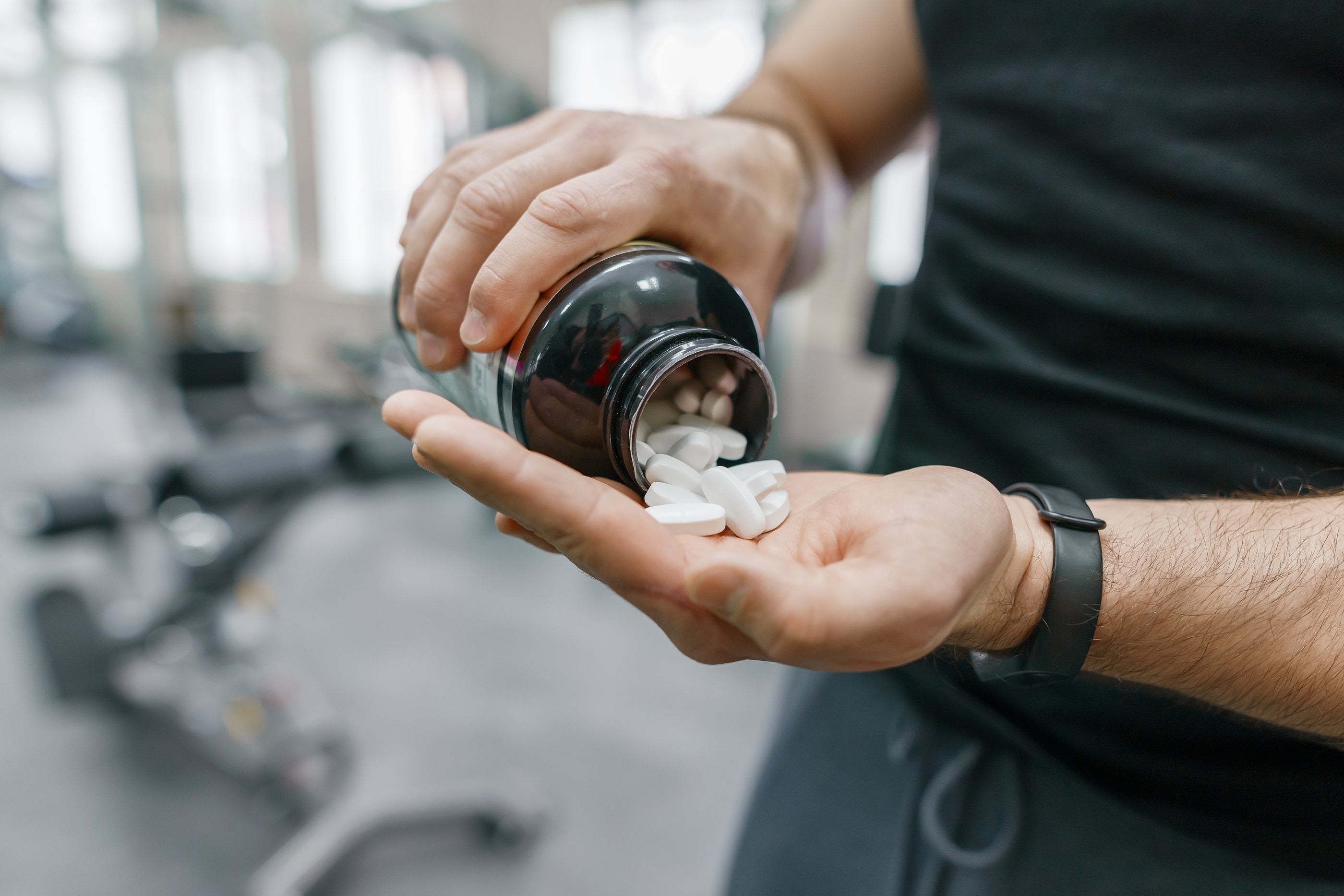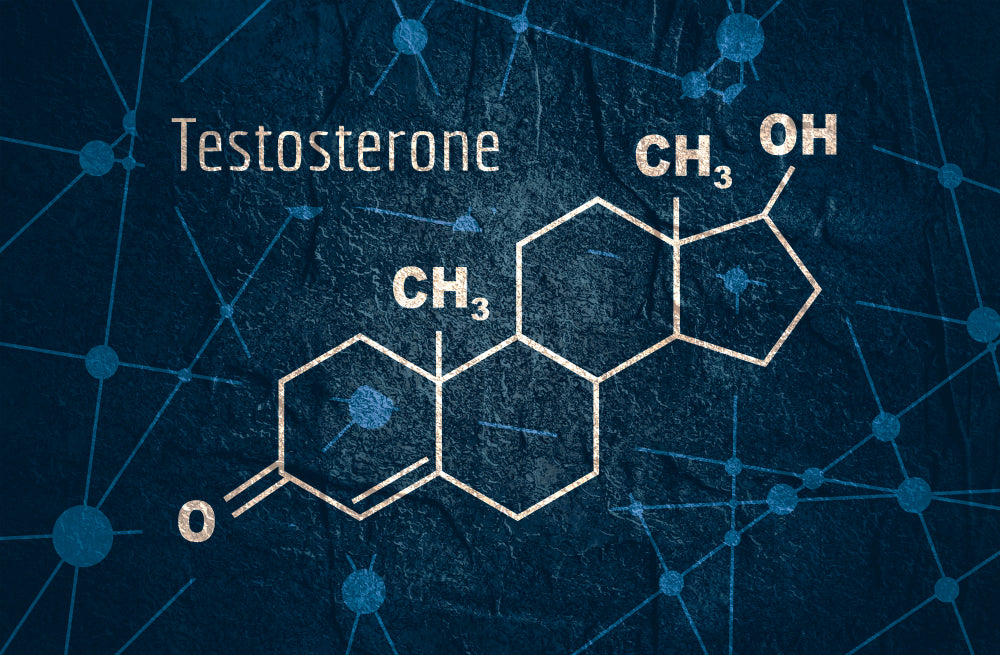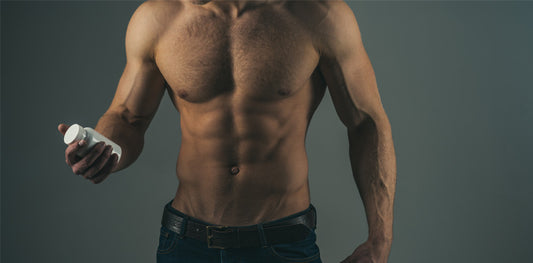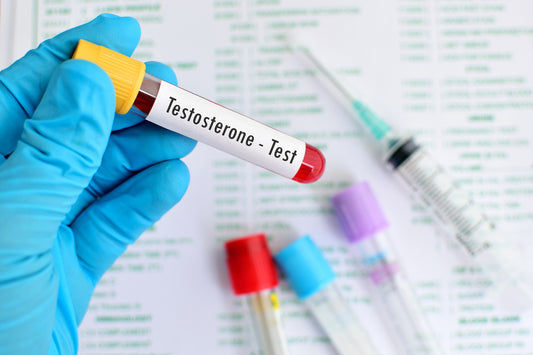While many of our bad decisions in our youth could arguably be blamed on testosterone. No man really wants to do with away with testosterone entirely.
Yet, every man, after a certain age, is hit with decreased testosterone levels, also known as the ol’ A.R.T.D.
That’s right: Age-Related Testosterone Decline.
This isn’t necessarily a bad thing. Nor is it necessarily a good thing.
It just is what it is. And like all things that just are, the manliest option presented to us is to just deal with it.
Naturally, one of the ways we deal with age-related testosterone decline is with natural testosterone booster supplements.
However, with so many test boosters on the market (not to mention cheap, ineffective T-boosters) the question on many of our minds is: do testosterone boosters actually work?
Fortunately, the question to this is: yes.
Or, at least, yes, some testosterone boosters work.
Discerning effective from ineffective T-boosters can be difficult. Especially considering that they all make similar claims of boosting free and total T, elevating your muscular strength, restoring your sex drive, etc., etc.
In this article, we make it easier to discern the good from the bad.
But before diving into all that, let’s first address the basics:
What Are Testosterone Boosters?

It’s all in the name: testosterone boosters are supplements that boost testosterone. These supplements can promote testosterone production naturally.
Doesn’t get much more complicated than that.
However, there’s a significant difference between:
- natural testosterone boosters, the types of T-raising ingredients you find in OTC supplements
- vs. synthetic T-boosters, such as illicit steroids and pharmaceutical T-amplifying options.
We don’t really need to dwell on the differences between the two here. Odds are you’re aware of steroids and their health risks.
In fact, much of the long-term downsides of steroids is what makes natural testosterone boosters, which encompasses a range of natural nutrients, compounds, and herbal extracts, so appealing.
To better understand what natural testosterone boosters are all about, let’s go through the various types.
Different Types and Are They Safe?
There is no one single testosterone booster. So the question of “are testosterone boosters safe?“ can’t be answered simply and quickly.
As you’ll see below, there are several effective T-boosters of different types that, when combined, stack up to a comprehensive T-raising combo.
These T-boosters range from vitamins and minerals to amino acids and botanicals.
Even certain fatty acids may help elevate and/or sustain healthy T activity.
However, by function, the different types of natural T-boosters include:
-
Raw T Precursor – nutrients and compounds that directly convert to testosterone are fundamental to healthy testosterone activity.
-
SHBG Inhibitors – compounds that inhibit sex hormone-binding globulin (SHBG), a protein that disables free testosterone, help keep your bioavailable testosterone “free” to act upon T receptors.
-
Aromatase Inhibitors – compounds that inhibit aromatase, an enzyme that converts T to estrogen, help with overall male sex hormone balance.
-
DHT Inhibitors – under special circumstances, DHT blockers may be recommended to inhibit the conversion of T to DHT, another important male sex hormone that, in excess numbers, may pose a significant risk to the prostate.
-
LH/FSH Promoters – some T-boosters indirectly increase testosterone production by promoting the activity of LH and FSH, two brain-secreted hormones that are directly responsible for testosterone synthesis and sperm quality.
Some testosterone boosters provide only one of these functions, whereas other T-boosters may be more multi-purpose.
However, no single testosterone booster delivers on all of these fronts, which is why it’s important to seek a well-crafted, pre-made T-booster stack.
Additionally, a comprehensive T-booster supplement that uses only premium, well-researched testosterone boosters tend to be safer than experimental or DIY T-booster stacks.
Generally speaking, natural testosterone boosters are safer than their synthetic and/or illicit counterparts. However, increased blood pressure can be a potential side effect.
Do Testosterone Supplements Really Work?
Not all testosterone supplements work for addressing low testosterone. This is one of the disappointing facts of the testosterone booster market.
This is typically due to poor ingredient forms, ineffective formula strategies, and inadequately low dosages.
However, a testosterone booster supplement may work really great for you, so long as it delivers:
-
(A) premium, potent ingredient forms
-
(B) a synergistic mix of ingredients that work better together than they would alone
-
(C) adequately dosed ingredients that aren’t hidden beneath a dosage-obscuring proprietary blend.
With such a daily, safe, effective T-booster, you may expect a life-changing array of male health and fitness benefits, such as:
Benefits of Testosterone Boosters That Work:
-
Increased Anabolic Muscle Gains and Increased Muscle Mass
-
Enhanced Strength and Athleticism
-
Reduce Fat Mass
-
Supercharged Sex Drive and Libido
-
Improved Erectile Dysfunction
-
Improved Cognition and Emotional Stability
-
Decreased Stress Levels
-
Restored Vitality and Vigor
And more.
Because testosterone is such a key hormone to male health, fitness, and performance, restoring healthy testosterone activity may go a long way in improving your overall life quality.
And in a funny turn of events, the more you raise your testosterone, the more active and confident you’ll feel. Which in turn only further contributes to healthy testosteronic activities.
In that sense, a testosterone booster is a gift that just keeps on giving.
Effective Ingredients to Boost Testosterone Levels Naturally

Despite the stereotype of men being “simple animals,” the male sex hormone machine is quite complicated.
At least, it’s complicated enough that no single testosterone booster is adequate enough to totally completely fix all your T-raising issues.
Instead, taking a combination, or a stack, of effective testosterone boosters, each with their own T-boosting bio-benefits, seems the best way to go to comprehensively optimizing your male hormone activities.
With that in mind, here are some of the best testosterone booster ingredients that, when paired together, may help elevate your masculine biology and boost free testosterone levels:
Vitamin D
A semi-essential micronutrient, vitamin D strongly correlates with testosterone status, though this vitamin’s exact bio-mechanism remains somewhat unknown. What we do know about vitamin D: no vitamin D, no T.
Okay, we know a little more than that.
Roughly speaking, there are two ways to maintain healthy T-promoting levels of vitamin D: (1) get adequate sunlight exposure, and (2) get adequate dietary intake of food-sourced vitamin D. These methods can help increase testosterone levels naturally. Though research tends to vary, the well-documented association between vitamin D and testosterone, as well as vitamin D and sunlight, may suggest that vitamin D supplementation is particularly important to male demographics that live in areas of poor sunlight.
Highly concentrated in the testes and T pathways, vitamin D seems to improve both total and free testosterone activity, with one study declaring vitamin D to be “important for the wellness of male sexual function.”
Vitamin K1 and K2
An underappreciated duo of T-boosting vitamins, vitamins K1 and K2, like vitamin D, seem to have a link to healthy testosterone levels. And, like vitamin D, the exact bio-mechanism seems unknown.
Regardless, animal studies have shown that under conditions of sub-optimal vitamin K intake, testosterone levels decline. Likewise, supplementing vitamin K in animal research has shown improvements in vitamin K levels in the testes, with some evidence suggesting vitamin K may also help restore T production.
Ashwagandha
A legendary herb and a staple of the Ayurvedic health tradition, Ashwagandha is a testosterone-boosting “adaptogen,” meaning that this botanical promotes health and fitness by helping the body adapt to the effects of stress to maintain a state of metabolic balance.
While the name “ashwagandha” roughly translates to “horse smell” in Sanskrit (due to the peculiar small and taste of this herb), ashwagandha seems to also elevate the masculine “horsepower” of its users, so to speak, by improving a man’s:
-
Physical Strength
-
Sex Drive
-
Sperm Quality
-
Virility
All of which are, of course, linked to testosterone.
Research suggests that ashwagandha (or Withania somnifera) may help improve male hormone status and semen quality by providing antioxidant protection for the testes while also optimizing the hormonal balance of luteinizing hormone (LH) and follicle-stimulating hormone (FSH), and even testosterone itself. This can lead to an overall improvement in testosterone levels.
However, take note: ashwagandha notoriously acts as a sedative as well, giving this herb somewhat of a nootropic edge. For cognitive relaxation, ashwagandha helps, which is why many bodybuilders and stimulant users use ashwagandha to help ease the jittery mental “edge” that sometimes comes with an active, hyped-up lifestyle.
Look for KSM-66®: an organic-certified full-spectrum ashwagandha root extract standardized to a bioactive 5% withanolides, KSM-66® is the go-to ashwagandha for many, from nootropic nerds to bodybuilding athletes. One promising study on the effects of KSM-66® on male health and fertility observed a 167% increase in sperm count, 53% increase in semen volume, 57% increase in sperm motility, 17% increase in total testosterone.
D-Aspartic Acid Calcium Chelate
Viewed by many as the best testosterone booster supplement, D-Aspartic Acid Calcium Chelate (D-AA-CC) is an amino acid with multiple pro-testosterone bio-activities.
Naturally present in the endocrine system, D-aspartic acid is most concentrated in the testes, where the amino seems to help regulate the production of testosterone, as well as other key sex hormones.
Unlike many other natural testosterone boosters, D-aspartic acid’s effects on testosterone synthesis are relatively much better understood. Research suggests this T-boosting amino assists with testosterone production by triggering a cascade of hormonal effects, including:
-
Stimulating the release of gonadotropin-releasing hormone (GnRH) by the hypothalamus
-
Promoting the production and secretion of luteinizing hormone (LH) in the pituitary gland via GnRH-stimulation
-
Encouraging the production of testosterone in the testes’ Leydig cells via the pro-testosterone effects of LH
From GnRH to LH to testosterone, in that order, D-AA-CC works within the hypothalamic-pituitary-gonadal (HPG) axis, an important control mechanism involved in the regulation of the reproductive system. In comparison, testosterone therapy is often considered for its potential benefits and risks, especially in the context of normal aging.
Ideally, it’s best to stack D-AA-CC with an estrogen blocker (see Luteolin below) to maximize D-AA-CC’s testosterone-boosting benefits while also mitigating any potential T-diminishing spikes in estrogen.
Mucuna Pruriens Extract
One of the most unique traditional herbs, Mucuna pruriens, otherwise known as “velvet bean,” is a fuzzy plant rich with L-DOPA (levodopa), a pro-dopamine amino acid believed to encourage testosterone production via the HPG axis.
Similar to D-AA-CC, Mucuna pruriens’ L-DOPA starts by stimulating the brain release of gonadotropin-releasing hormone (GnRH), which in turn stimulates the pituitary gland to product follicle-stimulating hormone (FSH) and luteinizing hormone (LH).
-
Respectively, FSH and LH promote sperm quality and testosterone synthesis, making the promotion of FSH and LH an indirect promotion of T.
A study from 2007 on the effects of Mucuna pruriens on stress and semen quality among infertile men observed significant improvements on stress levels, sperm count, and sperm motility, leading to the researchers to conclude that “M. pruriens not only reactivates the antioxidant defense system of infertile men but it also helps in the management of stress and improves semen quality.” The study also highlighted the herb's potential in counteracting the natural decline of testosterone levels.
Not to mention that Mucuna pruriens has also been associated with an increase in circulating growth hormone (GH) in exercise-trained men, making Mucuna pruriens an effective anabolic ergogenic as well as a male sex booster.
Luteolin
A yellow crystalline flavone, Luteolin is a potent antioxidant present in various fruits and vegetables. Often taken as a general health promoter, due to this compound’s notable attack on oxidative stress (free radicals), luteolin is also an effective T-booster thanks to this antioxidant’s inhibitory actions on aromatase.
When it comes to boosting T, aromatase is bad news. By blocking aromatase, an enzyme responsible for converting testosterone into estrogen, luteolin helps block testosterone boosters from inadvertently increasing estrogen levels.
When paired with a powerful T-booster, such as D-AA-CC, luteolin works by:
- Optimizing D-AA-CC’s androgen hormone support by sustaining heightened testosterone levels without heightened conversion to estrogen;
- Combatting age-related testosterone decline which favors estrogen over testosterone, partially due to the age-related increase in aromatase;
- Protecting circulating free testosterone to ensure greater anabolic, male-supportive activity from your male hormones.
As an antioxidant, luteolin’s benefits extend far beyond male hormone enhancement. However, luteolin’s association with aromatase inhibition make it particularly beneficial in the context of testosterone boosting, especially when paired with other more direct testosterone boosting ingredients.
What are the side effects from taking testosterone boosters?
Compared to synthetic testosterone boosting options (steroids) and TRT strategies, natural testosterone booster supplements pose a much lower risk of side effects.
Having said that, even natural testosterone boosting supplements have their risks.
We are dealing with hormones here, after all.
Yet, the side effects associated with most natural testosterone boosters are so varied and sparsely reported, that it’s somewhat difficult to get a clear view on the potential side effects of these T-boosters.
With that in mind, some complications include:
-
Increased irritability and anger
-
Acne flare-ups
-
Breast enlargement
-
Increased blood pressure
Without aromatase inhibition, enlarged breasts (gynecomastia) may become an issue.
Likewise, excessive intake of T-boosting minerals, such as zinc, may contribute to prostate issues, so be sure to keep your mineral levels in check so as not to elevate your DHT levels to high—via the conversion of T to DHT.
Some inferior testosterone boosting products have been associated with kidney and liver issues as well.
In general, it’s smart to add kidney- and liver-protecting supplements to your supplement regimen, if you’re taking a testosterone booster.
Final Verdict: Are Testosterone Boosters Worth It?
So, now that you know what testosterone boosters are all about—how they work, that they do work, the best types of testosterone boosters, etc.
the final BIG question remains: Should you take a testosterone booster?
Odds are if you’re here reading this article, you’re concerned about your T status, as most men are beyond a certain age.
Because that age may vary from man to man, with some men looking into testosterone boosters after they turn 30 and other men after they turn 40, there is no definite age for when testosterone boosters become a must. It is also important to consider ways to increase testosterone levels naturally, such as through lifestyle changes, supplements, and specific nutrients.
Even so, considering that T levels begin to see a gradual decline from your mid-20’s through your early 30’s, it’s worth looking into testosterone boosters if you’re within that age range and you feel your vigor and vitality aren’t up to their usual standard.
So, to answer the question: yes, natural testosterone boosters are worth it.
-
Nimptsch K et al. Association between plasma 25-OH vitamin D and testosterone levels in men. Clin Endocrinol (Oxf). 2012 Jul; 77(1): 106-112.
-
Sim MY et al. Seasonal Variations and Correlations between Vitamin D and Total Testosterone Levels. Korean J Fam Med. 2017 Sep; 38(5): 270-275.
-
Tirabassi G et al. Vitamin D and Male Sexual Function: A Transversal and Longitudinal Study. Int J Endocrinol. 2018; 2018: 3720813.
-
Takumi N et al. Dietary vitamin K alleviates the reduction in testosterone production induced by lipopolysaccharide administration in rat testis. Food Funct. 2011 Jul; 2(7): 406-11.
-
Ito A et al. Menaquinone-4 enhances testosterone production in rates and testis-derived tumor cells. Lipids Health Dis. 2011; 10: 158.
-
Shukla KK et al. Withania somnifera improves semen quality by combating oxidative stress and cell death and improving essential metal concentrations. Reprod Biomed Online. 2011 May; 22(5): 421-7.
-
Ambiye VR et al. Clinical Evaluation of the Spermatogenic Activity of the Root Extract of Ashwagandha (Withania somnifera) in Oligospermic Males: A Pilot Study. Evid Based Complement Alternat Med. 2013; 2013: 571420.
-
span>Topo E et al. The role and molecular mechanism of D-aspartic acid in the release and synthesis of LH and testosterone in humans and rats. Reprod Biol Endocrinol. 2009; 7: 120.
-
D’Aniello A et al. Occurrence of D-aspartic acid and N-methyl-D-aspartic acid in rat neuroendocrine tissues and their role in the modulation of luteinizing hormone and growth hormone release. FASEB J. 2000 Apr; 14(5): 699-714.
-
Shukla KK et al. Mucuna pruriens improves male fertility by its action on the hypothalamus-pituitary-gonadal axis. Fertil Steril. 2009 Dec; 92(6): 1934-40.
-
Shukla KK et al. Mucuna pruriens Reduces Stress and Improves the Quality of Semen in Infertile Men. Evid Based Complement Alternat Med. 2010 Mar; 7(1): 137-144.
-
Alleman RJ et al. A Blend of Chlorophytum Borivilianum and Velvet Bean Increases Serum Growth Hormone in Exercise-Trained Men. Nutr Metab Insights. 2011; 4: 55-63.
-
Balunas MJ et al. Natural Products as Aromatase Inhibitors. Anticancer Agents Med Chem. 2008 Aug; 8(6): 646-682.
-
Lu DF et al. Inhibitory effect of luteolin on estrogen biosynthesis in human ovarian granulosa cells by suppression of aromatase (CYP19). J Agric Food Chem. 2012 Aug 29; 60(34): 8411-8.
-
Almaiman AA. Effect of testosterone boosters on body functions: Case report. Int J Health Sci (Qassim). 2018 Mar-Apr; 12(2): 86-90.
-
Zirkin BR, Tenover JL. Aging and Declining Testosterone: Past, Present, and Hopes for the Future. J Androl. 2012 Nov-Dec; 33(6): 1111-1118.















